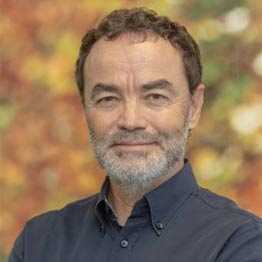26/01/2025
Published in
El Norte de Castilla, Diario Montañés and Diario de Navarra
Jordi Puig
researcher of the BIOMA Institute and professor of the School of Sciences of the University of Navarra.
 To Gus Speth, former Dean of the School of programs of study Environmental and Forestry at Yale University, is credited with having saidI thought the main environmental problems were biodiversity loss, ecosystem collapse and climate change. But I was wrong. The main environmental problems are selfishness, greed and apathy". Speth added that "to address these issues we need a cultural and spiritual transformation; and we scientists don't know how to address them. Or we do, but not alone. With science, indispensable. But not only with science. Also, and mainly, with Education.
To Gus Speth, former Dean of the School of programs of study Environmental and Forestry at Yale University, is credited with having saidI thought the main environmental problems were biodiversity loss, ecosystem collapse and climate change. But I was wrong. The main environmental problems are selfishness, greed and apathy". Speth added that "to address these issues we need a cultural and spiritual transformation; and we scientists don't know how to address them. Or we do, but not alone. With science, indispensable. But not only with science. Also, and mainly, with Education.
We refer to the Education from dozens of educations. Are we right, adjectivizing? Or does this multiplicity blur the essential and common of all Education? One Education would be the goal to achieve. But how to educate in the concrete without neglecting what is central?
The Education awaits us in everything we experience. Its purpose surpasses us and offers us continuous enrichment. Mainly, inwardly. In the face of a multitude of deficiencies, in the world and also personally, the Education offers us hope for much of what we lack, using a single word.
What if the central aspect of any Education were to direct it towards the care staff of the world? staff In a double sense: to care for everything from the most intimate part of the person and, at the same time, to care for that intimacy staff, in which precisely the care of everything should take root. We can (or not...) embrace every reality, place and moment as an opportunity to care. The exterior, the world, its value, would summon us to increase the intimacy staff from which the world is cared for: the heart. Only I can offer, from it, the care of the valuable (natural and human) that constitutes my environment and receives my influence. And I can only achieve it by developing that heart.
It is easy to forget the Education of this intimacy when we promote a specific Education , such as the environmental one. It is easier to teach and learn theoretical (knowledge) or practical (know-how) contents that do little to question our behavior staff. Or to propose educational objectives that hardly collide with our interests and way of life. This happens, for example, when we "educate" without asking ourselves about the connection between the production, availability and consumption staff of goods and inequality, poverty and environmental impact. A profound environmental Education calls for examining these uncomfortable connections in our daily lives. It seeks to dispose us to want to change personally to improve the world for everyone as radically as possible, with the serenity and effectiveness of care.
Heart. It does not seem that the most nuclear of the Education is the mere knowledge, nor the know-how, nor the individual interests, nor the proliferation of our activity or consumption, despite what is valuable in all these aspects of living. We need to educate ourselves until we become intimately caring, generators of life and servants of its quality in the world. To grow inwardly while taking care of the exterior. The greatest challenge for those who have hope in the Education, will it not be to better match the interiority with what the value of the world demands? The whole of the natural and human environment with which we relate is asking us to take care of it.
How to give an educational reply? Charlotte Luyckx offers a guide, in her Écophilosophie. It would be necessary to work at the same time on five increasingly deep layers of the human being: scientific-technical, economic, political, philosophical and spiritual. In this way, it ends up converging with Speth's diagnosis. We are offered to link the social action that is needed with a approach educational staff , of spiritual, intimate growth.
It would be about being a better person, caring. Each life staff that grows as an intimate caretaker of the world builds a new social reality of environmental quality. The most radical educational need would be the change from every heart that -ifSaint-Exupéry is right-sees the essential. The essential: perhaps the value of the world and the caring heart of the person, which would integrate much more than the emotional or sentimental. Caring world and heart. Education environmental.
